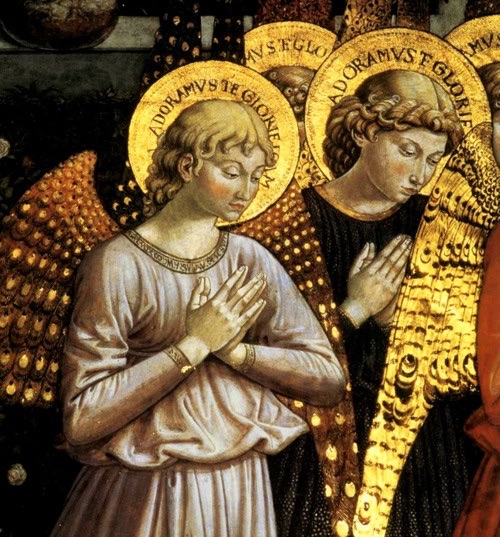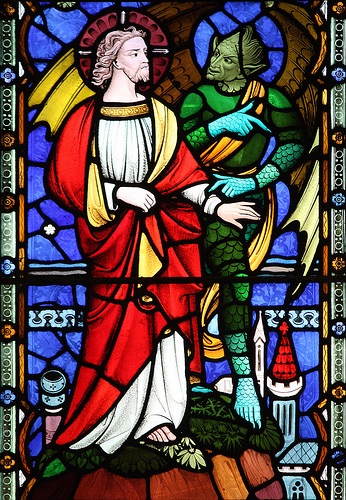ANGELS, PART IV, The Fallen Angels
Quotable Quote: “None of us will ever get to the point that we can let our guard down and coast on the assumption that we are too mature or too smart to fall.”
So far in this series on the angels we have only looked at the Blessed Angels. There is, though, that other third of the angels that are fallen. They are the devil and his minions called the demons. Frankly, I am not the type of Christian who is inclined to be fascinated with the demonic. Nor do I think it is wise to scare ourselves by giving too much attention to this subject. On the other hand, Paul taught that we should be aware of the “devil’s schemes.” So, we need to find a balance between fear mongering and foolish ignorance. Therefore, I am going to seek to provide some helpful information about the fallen angels that, hopefully, will equip the reader.
I will, again, rely on ancient and Medieval sources. However, I am going to throw in some insights I have gathered from pastoral experience and as a person.
THEIR FALL
Most Christians are aware that the bible teaches that 1/3rd of the angels fell from their lofty position in heaven and now oppose God’s plan and God’s people (Revelation 12:3-9). But, why and how? The why and how questions are typically what people want to know. The why-question can be answered from the picture provided in Isaiah 14, which has been typologically applied to Satan. The simple answer is pride. Here is a quote from Augustine.
“On the contrary, Augustine says (De Civ. Dei xiv, 3) that the devil ‘is not a fornicator nor a drunkard, nor anything of the like sort; yet he is proud and envious.'”
Spring-boarding off Augustine we can surmise that the angels are not capable of the “sins of the flesh” because they do not have bodies. Yet, they are capable of both pride and envy. So, Augustine adds, that the devil being “inflated with pride, he wished to be called God.” What does this mean, though? How exactly did the devil think he could be God? Was he that deluded? The answer is, no, he wasn’t so deluded that he thought he could be the Creator of the universe. Angels are a lot smarter than that.
Both Aquinas and Anselm–using sanctified reasoning–taught that the devil wanted to be like God in two ways. First, in his pride he thought he could be fully actualized as an angel in the “power of his own nature” (Aquinas, ST, 63, 3) without God’s grace. This is the classic “bootstrap” sin of “I can do it myself.” Only God can be fully actualized in Himself. All the rest of creation is dependent on Him. Secondly, the devil desired to “have dominion over others” (Ibid.). We can experience this ourselves when the devil tries to dominate our lives through temptation, sin, and deception.
So, out of pride and an envious desire to be self-reliant like God, the devil fell from heaven and led a third of the angels in rebellious opposition to God.
THEIR INFLUENCE
As we have already learned the Blessed Angels are used by God to enlighten our minds about Divine Truth. On the other hand, only God has the power to directly move the human will. What this leads us to is the insight that fallen angels are able to influence (but not direct) our decisions by stirring up images in our imagination or arousing sensual desires. Let’s face it–be real–we have all faced this sort of powerful satanic influence. Who of us has not awakened in the “midnight hour” and had all kinds of fearful images race across our minds? Who hasn’t had all manner of sensual desires stirred up to the point of tempting us to give in to their sway?
I have learned through life and the pastorate that the assaults of the devil will not cease in this life. None of us will ever get to the point that we can let our guard down and coast on the assumption that we are too mature or too smart to fall. In fact, Scripture teaches us that such an attitude is a set-up for failure.
1 Corinthians 10:12 So, if you think you are standing firm, be careful that you don’t fall!
1 Peter 5:8 Be alert and of sober mind. Your enemy the devil prowls around like a roaring lion looking for someone to devour.
Remember, though the devil is a fallen angel, he is a created spiritual being of a very high order. What he knows, he knows with complete clarity. This is one of the reasons why he is so good at deception. He knows the truth, so he can bend it. He is a master of making evil choices look good. Let me remind you, the devil never proposes evil directly. He always proposes something sinful as a “good” (review satan and Eve in Genesis 3). He never suggests, “Hey, do such-and-such because it is wrong and it will destroy your life.” The devil is not that stupid.
The devil also has a lot of clarity about the fragility of human nature and about our weaknesses. He is able to attack us at our most vulnerable point. So, that is why Scripture admonishes personal humility for ourselves and gentleness toward the frailty of others. We need to be humble enough to know that we are–except by God’s grace–easily tempted to sin and, therefore, ought to be gentle toward those who fall. We read about this in Galatians 6.
Galatians 6:1 Brothers and sisters, if someone is caught in a sin, you who live by the Spirit should restore that person gently. But watch yourselves, or you also may be tempted.
It is very easy to do the opposite of these two things. It is easy to start thinking that we are beyond doing really bad things. This is not true. Peter, the chief apostle, was adamant that he would never betray Jesus. He stands as Exhibit A for all Christians that “pride goes before a fall.” Pride leads us to easily believe in our own “spin.” We really aren’t as strong or good as we think. Humility of mind and constant reliance upon God is the antidote to this trap of pride.
Secondly, we can easily find ourselves subtly propping ourselves up by looking down on our fallen brothers and sisters. This, again, is merely pride rearing its ugly head. When we fall, we usually don’t need others piling-on by clucking their tongues, acting like they are invincible, or pretending they are part of the God-Squad “holding people accountable.” The Jesus approach actually heals and restores. Check out John 8:1-11. If I am reading the bible correctly, it is humility before God and gentleness toward others that opens the door for God’s grace. God’s grace is our greatest protection against the evil one.









